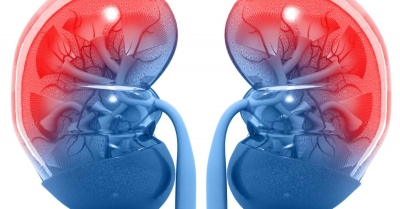
The kidneys are two bean-shaped organs in the renal system. They help the body pass waste as urine. They also help filter blood before sending it back to the heart.
The kidneys perform many crucial functions, including:
- maintaining overall fluid balance
- regulating and filtering minerals from blood
- filtering waste materials from food, medications, and toxic substances
- creating hormones that help produce red blood cells, promote bone health, and regulate blood pressure
The salt and water balance is maintained by a series of hormones acting on the kidney. The kidneys recognise and act upon a series of messages that vary according to how much fluid is drunk. If a person does not drink enough, the body fluids become more concentrated and, as a result, the kidneys excrete a more concentrated urine. If an excess of fluid is drunk, the body fluids become more diluted, and the kidneys excrete a more dilute urine, getting rid of the excess that has been taken in. These mechanisms are very efficient. If the body is in a satisfactory balance, approximately 80% of ingested fluid is excreted within an hour. Salts are also maintained within very strict limits. If an excess of sodium is taken, the amount in the blood increases and the person will become thirsty and drink fluid. The body senses this increase in salt and water, and again, through a series of messages, the kidney excretes the excess. As with sodium, if an excess of potassium is taken, it is excreted by the kidneys, ensuring that the amount in the body’s fluids remains within the correct limits.
Picture Credit : Google




